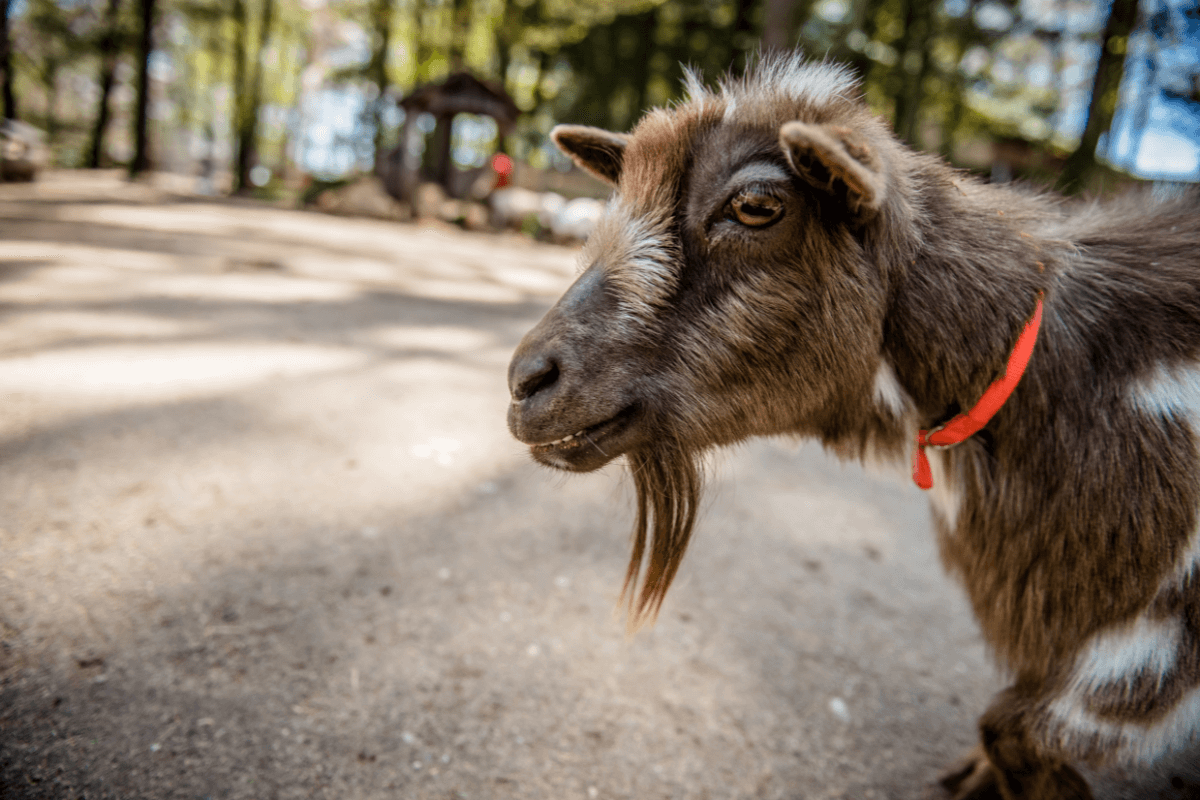There are quite a few things you need to do in order to keep your goat’s safe from harm.
Basic, regular maintenance takes quite a few forms and is necessary to keep your goats healthy.
I’ve always been very conscious of my goat’s health, but the other day a friend posed a question I hadn’t really considered before.
He has three dogs, and when one escaped recently, he had no trouble finding it again due to its collar.
Animal control picked him up and he was back home within a few hours.
It hasn’t happened before, but it got me worrying about what might happen if my goats escaped.
So, I decided to look into the question. Should goats wear collars?
Goats can wear collars, and if fitted properly they won’t pose any immediate threat of danger or discomfort.
In the short term, a collar on your goat is likely to be safe, with a few caveats to that point.
In the longer term, however, collars can pose a number of issues which I will get into.

Is it safe to leave a collar on a goat?
If you are being as careful as possible, the answer is no, it isn’t really safe to leave a collar on a goat.
Goats are ranging animals who like to have a lot of space to roam around and explore.
Unless you can keep an eye on your goats 24 hours a day, there is always the risk that they will become tangled up on something and even hung up.
This could cause injury or even death from choking.
There are collars with plastic, emergency clasps which are designed to break in the event of this happening.
There is nonetheless still a risk that they could hurt themselves getting caught and attempting to break themselves free even with a collar like this.
If you, for one reason or another, feel your goat needs a collar- there is at least one reason this may be the case which I will get into- then make sure to get one with a self-releasing strap.
Often, however, these particular collars are not designed for goats, and the material in the strap can damage their neck just by wearing it.
Make sure you’re getting a material that won’t hurt your goat.
Consider the range your goat has, as well.
If your goat has access to wooded areas or even just any area with a considerable amount of foliage, you always run the risk of it becoming caught on something.
If you can avoid it, you shouldn’t put a collar on your goat.
Can I walk a goat on a leash?
Despite what I’ve said so far, there may be circumstances where your goat ought to wear a collar, or where one may at least be useful.
Firstly, as I said, goats are ranging animals, and need to spend plenty of time moving around and wandering.
If you have goats, but not the land space to allow this, you can walk your goat to provide it with the stimulation it needs.
Obviously, in this case, a specialized collar is very handy.
There is also the option of a harness, which will chafe the goat’s neck less.
The overwhelming likelihood, if you live somewhere without large pasture to let your goats roam, that you live in a more built up neighborhood.
This is the one case where leaving a collar on your goat may be desirable; in some areas, animal control is not able to provide temporary housing for an escaped goat.
If they find an escaped goat, it could be sent to an auction.
A microchip, just like you would get for a cat or dog, will do an equally good job, however.
Animal control will still likely check for a microchip, in which case they will be able to contact you right away.
This is a much better option than a collar.
If your goat is escaped, there is any number of hazards it could get the collar caught on.
A collar should never be your first choice.
How can I lead my goat without a collar?
One of the main purposes goat owners report using collars is temporarily in order to be able to lead them.
You will likely need to handle your goats daily, especially if you have milking goats.
They will need to be led in and out of the barn both in the morning and evening and perhaps another two times a day for milking.
In this case, an easy latch collar could be handy, if you were putting it on when you start and taking it off as soon as you’re done.
There are a few other ways of doing this without a collar, though.
Halters are much easier to slip on and off when only needed for a few minutes, and won’t chafe their necks.
A simple rope, tied into a collar, provided it is of a softer material, would also do the trick.
Goats are stubborn, without doubt, and need to be led; collars aren’t the only way of doing so!
To wrap up, then, there are some cases where it’s useful for goats to wear collars.
In general, the best advice is not to leave your goat with a collar on all the time.
The collar could chafe their neck and damage their hair, if they are left to roam unsupervised, they could become tangled on something.
There are plenty of better alternatives to collars for goats, for whatever purpose you’re thinking of using one.
